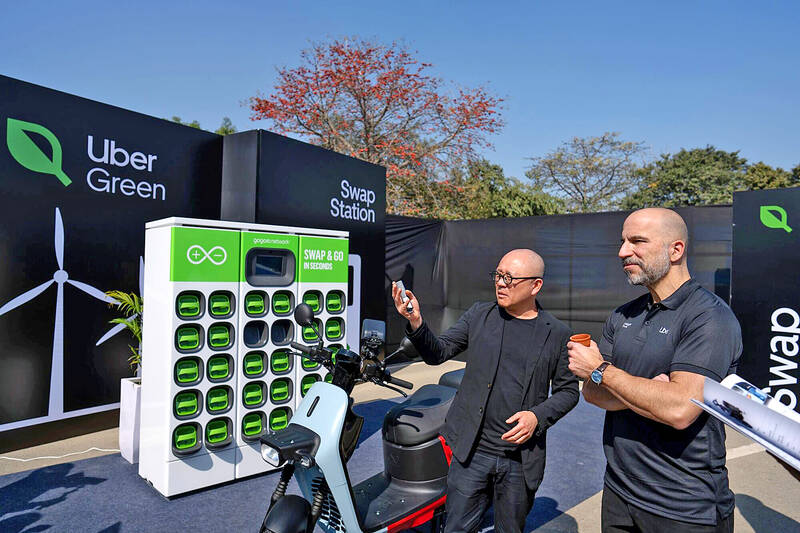Gogoro Inc (睿能創意), the nation’s biggest electric scooter maker, yesterday said that its chairman and CEO Horace Luke (陸學森) has resigned amid chronic losses and probes into the company’s alleged involvement in subsidy fraud.
The board of directors nominated Reuntex Group (潤泰集團) general counsel Tamon Tseng (曾夢達) as the company’s new chairman, Gogoro said in a statement. Ruentex is Gogoro’s biggest stakeholder.
Gogoro Taiwan general manager Henry Chiang (姜家煒) is to serve as acting CEO during the interim period, the statement said.

Photo: Anindito Mukherjee, Bloomberg
Luke’s departure came as a bombshell yesterday. As a company founder, he has played a key role in pushing for the company’s expansions at home and abroad, as well as Gogoro’s initial public offering on the NASDAQ.
Gogoro did not disclose the reason behind Luke’s decision to leave the company he founded 13 years ago.
“After much reflection, I have made the difficult decision to step down from my role as CEO and chairman of Gogoro. This decision has not been easy, but I believe it is the right time for the company and I to transition leadership as we embark on the next phase of growth,” Luke said in an internal e-mail sent to Gogoro employees. “My confidence in Gogoro’s bright future remains steadfast. I will always be Gogoro’s biggest advocate, and I look forward to seeing the company continue to grow and succeed from a new vantage point.”
As the company has been struggling to eke out a profit, poor financial performance is widely considered to be the main factor for Luke’s departure. Losses ballooned from US$5.6 million in the second quarter last year to US$20.1 million for the same period this year. Gross margin also plunged from 15.2 percent a year ago to 5.2 percent last quarter.
As of Thursday, Gogoro’s stock price has tumbled about 92 percent from its closing price of US$14.02 during its IPO in 2022 to US$1.05, indicating that investors have lost confidence in the company’s prospects.
In addition, former employees have tipped off the Ministry of Economic Affairs about Gorogo’s alleged subsidy fraud, Business Today reported on Wednesday.
Gogoro has allegedly been using Chinese engines and key parts to reduce manufacturing costs, despite reporting to the ministry that it was using locally made parts to get government subsidies, it said.
Gogoro has received more than NT$600 million (US$18.75 million) in subsidies by allegedly faking domestic key components, the report said.
The ministry said it has received tip-offs and is investigating Gogoro’s practices. The ministry grants special subsidies to encourage adoption of domestically made key parts.

Chizuko Kimura has become the first female sushi chef in the world to win a Michelin star, fulfilling a promise she made to her dying husband to continue his legacy. The 54-year-old Japanese chef regained the Michelin star her late husband, Shunei Kimura, won three years ago for their Sushi Shunei restaurant in Paris. For Shunei Kimura, the star was a dream come true. However, the joy was short-lived. He died from cancer just three months later in June 2022. He was 65. The following year, the restaurant in the heart of Montmartre lost its star rating. Chizuko Kimura insisted that the new star is still down

While China’s leaders use their economic and political might to fight US President Donald Trump’s trade war “to the end,” its army of social media soldiers are embarking on a more humorous campaign online. Trump’s tariff blitz has seen Washington and Beijing impose eye-watering duties on imports from the other, fanning a standoff between the economic superpowers that has sparked global recession fears and sent markets into a tailspin. Trump says his policy is a response to years of being “ripped off” by other countries and aims to bring manufacturing to the US, forcing companies to employ US workers. However, China’s online warriors

Application-specific integrated circuit designer Faraday Technology Corp (智原) yesterday said that although revenue this quarter would decline 30 percent from last quarter, it retained its full-year forecast of revenue growth of 100 percent. The company attributed the quarterly drop to a slowdown in customers’ production of chips using Faraday’s advanced packaging technology. The company is still confident about its revenue growth this year, given its strong “design-win” — or the projects it won to help customers design their chips, Faraday president Steve Wang (王國雍) told an online earnings conference. “The design-win this year is better than we expected. We believe we will win

Intel Corp chief executive officer Lip-Bu Tan (陳立武) is expected to meet with Taiwanese suppliers next month in conjunction with the opening of the Computex Taipei trade show, supply chain sources said on Monday. The visit, the first for Tan to Taiwan since assuming his new post last month, would be aimed at enhancing Intel’s ties with suppliers in Taiwan as he attempts to help turn around the struggling US chipmaker, the sources said. Tan is to hold a banquet to celebrate Intel’s 40-year presence in Taiwan before Computex opens on May 20 and invite dozens of Taiwanese suppliers to exchange views